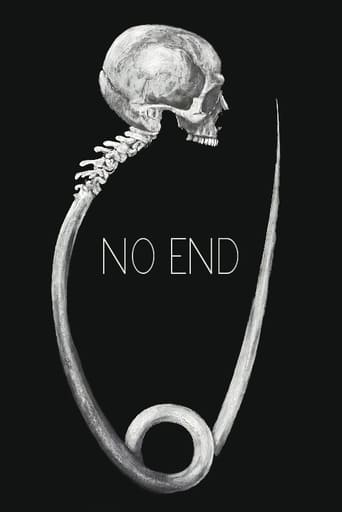

We might call Krzysztof Kieslowski's "Bez konca" ("No End" in English) a Polish predecessor to "Ghost", but that doesn't do it justice. This movie emphasizes the woman and how she tries to take up her late husband's task under difficult circumstances. Set in 1982, when Poland was under martial law and the Soviet-backed government was persecuting the Solidarity labor movement, it focuses on Urszula Zyro (Grazyna Szapolowska). Her lawyer husband Antek dies and she has to find a replacement for him in a case. But his spirit remains to watch over her and their son.This was a bold movie for its time. I don't know whether or not Poland had eased up on its persecution of Solidarity by the time that it got released (it was a sad irony that in the 21st century, long rid of Soviet domination, Poland assisted in the extraordinary rendition program). I suspect that this was one of the first Polish movies to feature a sex scene, if not the very first (by contrast, the first Soviet movie to feature a sex scene was 1988's "Little Vera"). Whatever the case, it remains an important piece of cinema history, and reminds us why Kieslowski was one of Europe's most influential directors.
... View MoreWhat has been seen of Krzysztof Kieslowski (almost all his films and 'Dekalog' in its entirety) all ranges between very good (the 8th episode of 'Dekalog') to masterpiece ('Three Colors: Red' and 'Blue' and the whole 'Dekalog' series). To me, he was an immensely gifted director, who died far too early.'No End' is not one of Kieslowski's best, but like 'Camera Buff' it is another early film of his that deserves more love and attention. It may be alienating and strange to some viewers (its, as reasoned, pro-solidarity sentiments must have been reason enough for it to not be released internationally for over a year) and his more international work is somewhat more accessible. However, while some of the political story could have had more clarity in places, 'No End' is great in many ways with all the typical Kieslowski strengths that make his films so good.As was always the case in Kieslowski's work, 'No End' is made exceptionally. As well as being beautifully shot with atmospheric use of colour to match the mood, it is gritty yet beautiful with many thoughtful and emotionally powerful images and little things lingering long into the memory. Kieslowski's direction is quietly unobtrusive, intelligently paced and never too heavy. The music is suitably intricate.It's a thought-provoking film in writing, as ever thematically rich and with complex characters, and resists the trap of rambling. The 3-part story is intriguingly told, and while the political story could have done with more clarity the emotional story is harrowing and affecting and the metaphysical story fascinating. 'No End' is always engaging and suitably challenging. The acting is as always from Kieslowski marvellously nuanced and natural, especially from heart-wrenching Grazyna Szapolowska.Summing up, not among the best work of Kieslowski but deserves more love as a result of being overshadowed by his later stuff from 'Dekalog' onward. 9/10 Bethany Cox
... View More"No End" is one of the strangest films I have ever seen. Overall, I think I like it...but I'm not sure--especially in light of the ending that left me very cold.This film begins with one of the most interesting and striking scenes to ever start a movie. A dead man talks about his death to the audience and describes the heart attack that took him. Then, throughout the film, the man appears and watches the action. And, in a couple instances, he's seen by others or a dog! Weird, that's for sure.The dead man, Antek, was a lawyer and he was working on a very difficult case. In 1982 when the film was set, the labor union Solidarity was pushing for reforms and freedom from the Soviet- dominated government. The lawyer had been defending one of those arrested in a repressive move by the government...but his heart attack left the guy without a defense attorney. The widow, Ula, is now trying to piece together all her dead husband's notes and she becomes interested in the freedom movement. However, she also is incredibly depressed and finds her life without meaning now that he's gone. Where all this goes is very strange...very strange!This film is NOT for everyone by any stretch! It's very sexually explicit and it's also very weird, artsy as well as confusing. I can easily imagine folks hating it or loving it or, like me, are just plain baffled by it.By the way, I did find the context for the film surprising. It was made in Poland in 1985--while the country was STILL being run by the repressive Soviet-backed government of General Jaruzelski. I cannot imagine that they would have allowed such a film to be made...but it was! Also, throughout the film you keep seeing a black Labrador Retriever...and one of the characters was named Labrador. Was this a deliberate pun?
... View MoreThe films by Krzysztof Kieslowski can be separated into two parts; the Polish films and the international films. The Polish films were concrete and filled with the mirthless Polish reality. The international films (the last four) were much more absurd, ethereal and characterized with aesthetic styling. In 1985 Kieslowski was already very appreciated in the European art-house cinema due to his international breakthrough, Camera Buff in 1979. No End was his first film with the screenwriter Krzysztof Piesiewicz and composer Zbigniew Presiner, with whom he continued working in all of his later film.Poland is under martial law and Solidarity is banned. A woman's (Ula) husband suddenly dies, who was a lawyer of an opposition activist. After his death Ula realizes how much he meant to her and begins to love him more and more. The activist needs another lawyer and Ula recommends an older more experienced lawyer, who has a much more calm approach. While the trial goes on Ula tries to get rid of the ghost of her husband. She tries hypnosis, sex and oblivion - but in the end is forced to commit a suicide - the only way out.A very overwhelming thing in No End is the fact that Ula must commit a suicide. There is no other way out of the system, there is no end for the yearning of love and peace. Killing herself and leaving her young boy alone is the only way for her to live, to have peace and to get rid of the ghost. The last shot where she walks among her husband is very paradoxical.Krzysztof Kieslowski says in his interview book, Kieslowski on Kieslowski that it was very hard to get No End on the screens. WFD (The Government's documentary film office), which usually allowed and financed the films in Poland, wasn't interested. It didn't want a film to show Poland giving false sentences under martial law. After Kieslowski got the production rolling with Piesiewicz WFD didn't want to pay the salaries for the cast & crew. Kieslowski had to go there himself to demand them to pay for their work - at the same he, of course, denied to take money for himself. When the film finally was ready the Government, the church and the critics hated it and it was very hard to see. But the audience, the people who actually saw it loved it. They said that it was the best description anyone had made about the martial law in Poland.Watching No End today is very interesting and I think it has gained more value in the course of time. It's an incredibly realistic description of its time and it shows how sad things were back then. "During the martial law we all weighed our heads. And my generation never raised its head back up." Krzysztof Kieslowski. Even that I am familiar with kieslowskian pessimism and it can be seen in all of his films, I think No End is his most pessimistic picture of the Polish reality. The whole movie and especially the ending shows us that there is no hope and No End for all this.Kieslowski said that the biggest flaw of No End was that it had three separate parts and it didn't work as an entirety. The political part, where the activist tries to choose whether to fight or fall. The emotional part, where the woman falls in love with a dead man and finally the metaphysical part, where the dead man takes contact with the living. I think all of these different things work brilliantly and do no harm on the film. Metaphysics is a branch of philosophy, which tries to explain the fundamental nature of being and to my mind in addition to this Kieslowski tried to study the true nature of love.The acting and the cinematography of No End is very raw, brutal documentary. This incredible concreteness Kieslowski was able to achieve in Dekalog and No End was because of his long experience with documentaries, which he had made seven of. The nature of the film changed during the process; in the beginning Kieslowski intended to make a film about guilt and at sometime he was going to title the film, Happy Ending due to its final shot with the man and the woman walking together. But in the end No End is a philosophical film, a picture of reality and its time, a paradox of politics and a study of the true nature of love.As is the film so is the title very complex and it has many purposes. I think the title works for all of the three different parts. There is No End for the martial law and oppression; the activist is unable to fight against the Government. Nor is there end for the being of man and the love of the woman. There is No End in sight.
... View More